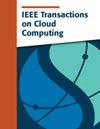AI Applications Resource Allocation in Computing Continuum: A Stackelberg Game Approach
IF 5.3
2区 计算机科学
Q1 COMPUTER SCIENCE, INFORMATION SYSTEMS
引用次数: 0
Abstract
The growth, development, and commercialization of artificial intelligence-based technologies such as self-driving cars, augmented-reality viewers, chatbots, and virtual assistants are driving the need for increased computing power. Most of these applications rely on Deep Neural Networks (DNNs), which demand substantial computing capacity to meet user demands. However, this capacity cannot be fully provided by users’ local devices due to their limited processing power, nor by cloud data centers due to high transmission latency from long distances. Edge cloud computing addresses this issue by processing user requests through 5G, which reduces transmission latency from local devices to computing resources and allows the offloading of some computations to cloud back-ends. This paper introduces a model for a Mobile Edge Cloud system designed for an application based on a DNN. The interaction among multiple mobile users and the edge platform is formulated as a one-leader multi-follower Stackelberg game, resulting in a challenging non-convex mixed integer nonlinear programming (MINLP) problem. To tackle this, we propose a heuristic approach based on Karush-Kuhn-Tucker conditions, which solves the MINLP problem significantly faster than the commercial state-of-the-art solvers (up to 50,000 times). Furthermore, we present an algorithm to estimate optimal platform profit when sensitive user parameters are unknown. Comparing this with the full-knowledge scenario, we observe a profit loss of approximately 1%. Lastly, we analyze the advantages for an edge provider to engage in a Stackelberg game rather than setting a fixed price for its users, showing potential profit increases ranging from 16% to 66%.计算连续体中的人工智能应用资源分配:一个Stackelberg博弈方法
自动驾驶汽车、增强现实观看器、聊天机器人和虚拟助手等基于人工智能的技术的增长、发展和商业化正在推动对增强计算能力的需求。这些应用大多依赖于深度神经网络(dnn),这需要大量的计算能力来满足用户的需求。但是,由于用户本地设备的处理能力有限,无法完全提供这种容量,而云数据中心由于远距离传输的高延迟,也无法完全提供这种容量。边缘云计算通过5G处理用户请求来解决这个问题,这减少了从本地设备到计算资源的传输延迟,并允许将一些计算卸载到云后端。本文介绍了一种基于深度神经网络的移动边缘云系统模型。将多个移动用户与边缘平台之间的交互作用表述为一个领头多follower的Stackelberg博弈,从而产生一个具有挑战性的非凸混合整数非线性规划(MINLP)问题。为了解决这个问题,我们提出了一种基于Karush-Kuhn-Tucker条件的启发式方法,它解决MINLP问题的速度明显快于商业最先进的解决方案(高达50,000次)。此外,我们还提出了一种在敏感用户参数未知的情况下估计最优平台利润的算法。与完全了解情况相比,我们观察到利润损失约为1%。最后,我们分析了边缘提供商参与Stackelberg游戏而不是为其用户设定固定价格的优势,显示潜在利润增长从16%到66%不等。
本文章由计算机程序翻译,如有差异,请以英文原文为准。
求助全文
约1分钟内获得全文
求助全文
来源期刊

IEEE Transactions on Cloud Computing
Computer Science-Software
CiteScore
9.40
自引率
6.20%
发文量
167
期刊介绍:
The IEEE Transactions on Cloud Computing (TCC) is dedicated to the multidisciplinary field of cloud computing. It is committed to the publication of articles that present innovative research ideas, application results, and case studies in cloud computing, focusing on key technical issues related to theory, algorithms, systems, applications, and performance.
 求助内容:
求助内容: 应助结果提醒方式:
应助结果提醒方式:


